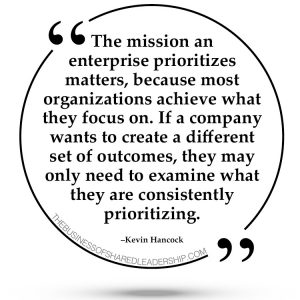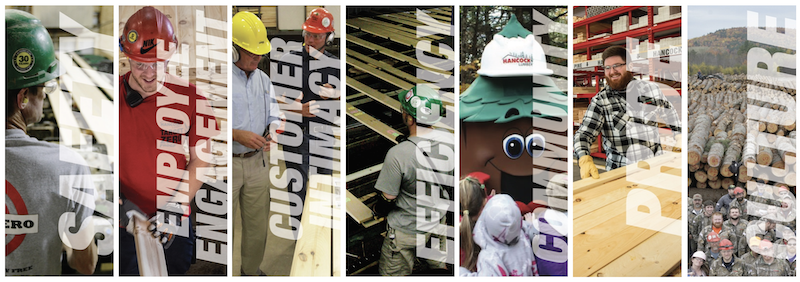“Your purpose in life is to find your purpose and give your whole heart and soul to it.”
—Buddha
 Earlier this year I shared the following short message with everyone at Hancock Lumber:
Earlier this year I shared the following short message with everyone at Hancock Lumber:
Hello! I was doing some work with another company in another industry yesterday. The subject of their “mission statement” was on the agenda. The company has great values and a compelling mission, but their path to describing it was quite technical. As a result, it didn’t resonate on an emotional level.
I then experienced a moment of anxiety, hoping that I’m able to be fully human as a CEO in my communication of our shared mission.
So here I am.
For me, the first mission of our company is to help everyone feel trusted, respected, safe, valued, and heard – exactly as you are. No change is necessary for you to be amazing.
Manufacturing lumber is important to our company, but it’s not the mission.
Logistics are also important, but they are not the core mission either.
Sharing leadership broadly, dispersing power to everyone, and respecting all voices—that’s the mission. Work should be meaningful for the people who do it.
A few moments after sending that e-mail, I began receiving messages back. Here was the first one to arrive in my in-box:
I think our mission and purpose is very clear and easy to understand for everyone. Many organizations’ missions become a long list of often difficult-to-understand statements that have little, if any, meaning to most employees. A GREAT mission is one which if you ask any randomly selected person within the organization to recite, they would be able to—ours fits that definition.
* * *

The mission an enterprise prioritizes matters, because most organizations achieve what they focus on. If a company wants to create a different set of outcomes, they may only need to examine what they are consistently prioritizing.
Additionally, I don’t believe in a singular corporate mission. A world-class company is highly dynamic and will create benefits that advance society on multiple levels. At Hancock Lumber, for example, we expect to be highly valuable to not just employees but also to customers, suppliers, stockholders, and the communities we serve. We aspire to positively impact our industry, our state, and the nation—even humanity as a whole. That’s a whole lot of mission.
So the real question becomes, where is the critical first focal point that, when ignited, will fuel and drive value creation for the whole? This is the foundational mission, the one that paves the way for all the others. It’s the point on the fly-wheel where the energy must be applied. For us that’s the employee experience. All other experiences, we believe, are derived from that one.
A great mission must be personally and immediately actionable, accessible to everyone. No complex training is required. Magic missions are intuitive. The moment you meet one, you know what to do—and what not to do. When you have a mission worthy of pursuing, everybody wins, and the victory reverberates far beyond the boundaries of the company.
* * *
Here are some traditional corporate mission statements:
- Our mission is to maximize shareholder value.
- Our mission is to achieve peak production efficiency.
- Our mission is to grow and become the number-one supplier in our market.
- Our mission is to sacrifice whatever is required in service to our customers.
The problem with each of these objectives is that the benefits of achieving them can feel as though they are bypassing the people doing the work. Workers should work first for their own joy, growth, advancement, challenge, fun, and financial benefit. That’s a great set of goals and it’s not just ok, but actually desirable to pursue them. Work should fill your own cup and when it does your performance will create great value for others.
Advancement of self should be front and center in any foundational mission. Shareholder value, corporate productivity, revenue growth, and customer care are all important but as the outcomes of a higher calling.
Humanity is always ultimately advanced on a local level, where humans reside. The place of work should be first and foremost for the humans that work there. When the employees soar everyone is advanced.
Most companies get exactly what they ask for.
What’s yours asking for?
“I spend a tremendous amount of time carefully choosing the roles I wish to play so that I can run from the role I was born to play.”
—Craig Lounsbrough
______
Thank you for considering my thoughts. In return I honor yours. Every voice matters. Nestled between our differences lies our future.
______
This is the thirty-seventh post in a series of short essays to be posted by Kevin to www.thebusinessofsharedleadership.com in 2021. Kevin is dedicating these writings in honor of Black Elk, the Oglala Sioux holy man who was escorted as a child on a sacred vision quest by the 48 horses of the four directions to visit the six Grandfathers. My horses, prancing they are coming. They will dance; may you behold them. On that journey Black Elk understood the sacred power that dwelled within him and lives within us all. He also recognized that this power could be used for good or bad. Intentional we must be about the path we walk. To invite others to join The Business of Shared Leadership and receive these posts, just pass this link along. The more who join, the deeper the energy field of engagement will become! Thank you!